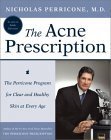Cystic Acne Treatment
 These cysts are caused when hormonal shifts result in your skin glands overproducing oil (sebum) at an unnatural rate. The gland becomes swollen and eventually bursts, but not before the sebum has swelled and hardened into a clump too large to escape by means of your pores. The irritation from your gland bursting results in inflammation, and buried pustule can remain in your skin for a very long time."
These cysts are caused when hormonal shifts result in your skin glands overproducing oil (sebum) at an unnatural rate. The gland becomes swollen and eventually bursts, but not before the sebum has swelled and hardened into a clump too large to escape by means of your pores. The irritation from your gland bursting results in inflammation, and buried pustule can remain in your skin for a very long time."Healthnewsflash has written cystic acne treatment, and they write "Severe Nodular or Cystic Acne Treatment, Acne where infections are deep under the skin and do not raise to the surface of skin is called severe nodular acne or cystic acne. Cystic acne heals very slowly as infection waste material is not discharged. People with nodules or cysts should be treated by a dermatologist. For patients with severe inflammatory acne that does not improve with medicines such as severe nodular or cystic acne, a doctor may prescribe isotretinoin (Accutane*), a retinoid. Isotretinoin is an oral drug that is usually taken once or twice a day with food for 15 to 20 weeks. It markedly reduces the size of the oil glands so that much less oil is produced. As a result, the growth of bacteria is decreased."
Onlinebuffalo has written cystic acne treatment, and they write "Different Types of Acne, Different Treatments ? Cystic Acne Treatment, Acne can range in severity from a relatively small number of whiteheads, to a proliferation of cysts and nodules, which can be as physically painful as they are psychologically upsetting. Severe cystic acne needing cystic acne treatment can be resistant to most treatments, and in fact cystic acne treatment can produce side effects that are as upsetting as the condition itself. For the many sufferers of this kind of acne however, refusing treatment is not an option, so here are some things to be aware of before undergoing your cystic acne treatment."
Acnease has written cystic acne treatment, and they write "Treatment of Cystic Acne, Cystic acne needs to be treated due to the likelihood of additional cysts forming and the propensity for scarring. Dermatologists may elect to drain the lesions if they are severe and offer a course of antibiotics. An alternative treatment is injections of cortisone into the cysts to decrease the inflammatory response. Accutane is used by many dermatologists due to the severe nature of the acne. The teratogenic effects of accutane restrict its use in women of child bearing potential. Therefore, it is crucial that women of childbearing age are not pregnant and do not get pregnant while taking accutane. Women must use an appropriate birth control method for 1 month before therapy begins, during the entire course of therapy, and for 1 full month after therapy stops. Women should talk to their doctor about when it is safe to get pregnant after therapy with accutane has stopped. This is problematic since many women develop cystic acne in response to hormonal fluctuations. In addition Accutane is noted to have a depressive effect on young male and today a release form is requested form those who intend to use the product."
Read more!









